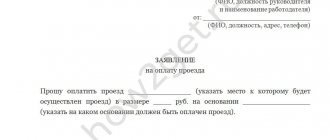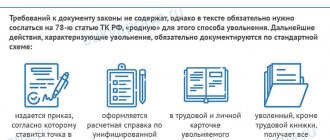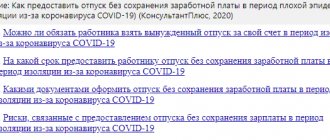Compensation payments: what the Labor Code of the Russian Federation says
Compensation is the reimbursement by the employer of the costs that the employee incurred in the performance of his work duties (Article 164 of the Labor Code of the Russian Federation).
Such payments are not part of employee salaries and have a specific purpose: to reimburse employees for business expenses. It is necessary to distinguish between the concepts of “compensation” and “compensation payments”. According to the Labor Code, compensation payments are divided into two types:
- Compensating special working conditions.
- Compensating material costs for the employee.
https://www.youtube.com/watch?v=ytcopyright
In this case, compensation for special working conditions is included as part of the salary, and compensation for material costs is not included in the salary.
For example, if the position involves the use of the employee's personal car for business purposes, the employer may compensate for the wear and tear of the vehicle. And if we are talking about performing a labor function in a territory subject to radioactive contamination, the employee is paid an allowance for hazardous working conditions, which is included as part of the salary.
Child benefits
Compensation can also be provided in the form of payment for food, depreciation for the use of personal vehicles for work purposes, for renting housing, for mobile communications. Payments may be assigned in connection with the replacement of part of the vacation with monetary compensation.
The social security system for citizens of the Russian Federation provides both one-time and regular benefits that perform a compensatory function. The purpose of such payments is to compensate a person for losses from forced refusal of employment, to cover damage resulting from a force majeure situation (for example, a man-made disaster).
State bodies may assign compensation for care:
- for a person with group 1 disability;
- for an individual who has reached the age of 80 years;
- for an elderly citizen in need of constant care.
The legal regulation of these compensation payments is carried out by the norms of Decree of the President of the Russian Federation dated December 26, 2006 No. 1455. Funds are issued on a monthly basis - 1200 rubles. for each person being cared for. If we are talking about caring for disabled children (under 18 years of age) or a disabled person from childhood of group 1, one should be guided by the norms of Presidential Decree No. 175 of February 26, 2013. According to it, the amount of compensation payments may differ:
- 5500 rubles, if the recipient of the money is a parent, guardian, adoptive parent, trustee;
- 1200 rubles, if the payment is assigned in favor of other persons.
Only persons of working age are entitled to these compensations, since the benefit is paid to them as compensation for the loss of the opportunity to work. All payments are adjusted by the territorial coefficient (if it is applied in the region).
Monthly compensation payments are due to persons affected by environmental disasters caused by man-made factors. This category includes victims of the accident at the Chernobyl Nuclear Power Plant, at the Mayak Production Association, and during nuclear tests at the Semipalatinsk test site. Legal support includes:
- Government Decrees No. 136 dated 03/03/2007, No. 907 dated 12/31/2004 on social support measures for victims of radiation;
- Law of May 15, 1991 No. 1244-1 on the social protection of citizens exposed to radiation during the Chernobyl accident;
- Law of November 26, 1998 No. 175-FZ on victims of radiation during the accident at PA Mayak;
- Law of January 10, 2002 No. 2-FZ on guarantees to persons affected by radiation during nuclear tests at the Semipalatinsk test site.
These standards include compensation for harm to health, for the loss of a breadwinner, for accommodation on the territory, for meals for schoolchildren, for health improvement, for relocation, etc.
Benefits and compensation for travel and luggage are valid for internally displaced persons (approved by Government Decree No. 713 dated December 1, 2004). If the move is the result of participation in the state program for the voluntary resettlement of compatriots from abroad to the Russian Federation, compensation for the costs of transporting property, processing documents and registering at a new place of residence is carried out in accordance with Government Decree No. 150 dated March 10, 2007.
https://www.youtube.com/watch?v=ytadvertise
Order of the Ministry of Labor dated September 23, 2014 No. 657n provides for monetary compensation payments in the Russian Federation to disabled people and veterans to reimburse the costs of independently purchasing rehabilitation equipment, prosthetic products, and for the maintenance and veterinary care of guide dogs.
Combat veterans, labor veterans, and World War II veterans are paid a number of additional compensations (for example, for utility bills and housing payments). The procedure for their appointment is regulated by the Law “On Veterans” dated January 12, 1995 No. 5-FZ.
In addition to payments for work under special conditions, the employer compensates for payments that are not included in the salary (Article 165 of the Labor Code of the Russian Federation).
Pay compensation to the employee in the following cases:
- when sending an employee on business trips;
- when moving to work in another area;
- when performing state or public duties;
- when combining work with education;
- in case of forced cessation of work through no fault of the employee;
- when providing annual paid leave;
- in some cases, termination of an employment contract;
- due to a delay due to the employer’s fault in issuing a work book upon dismissal of an employee.
The employer compensates the employee for all funds due from his own budget. If an employee performs state or public duties (for example, participates in an election commission, becomes a donor, participates in a trial as a juror, etc.), the bodies and organizations in whose interests he acted make payments in the manner established federal legislation and other legal acts of the Russian Federation.
Table. Grounds for payment of compensation to a worker
| When to compensate | What expenses should be compensated? |
| When sent on a business trip (Article 168 of the Labor Code of the Russian Federation) | Travel expenses |
| Expenses for renting residential premises | |
| Daily allowance | |
| Other expenses | |
| When moving to work in another area (Article 169 of the Labor Code of the Russian Federation) | Expenses for relocation of the employee, his family members and property |
| Expenses for settling into a new place of residence | |
| When an employee performs state or public duties (Chapter 25 of the Labor Code of the Russian Federation) | Maintaining average earnings while performing state or public duties |
For employees whose permanent work is traveling in nature, compensate for:
- Travel expenses.
- Expenses for renting living quarters if the employee cannot return to his place of residence every day.
- Additional expenses associated with living outside the place of permanent residence, that is, daily allowance, field allowance.
- Other expenses that the employee incurred with the permission or knowledge of the employer, for example, expenses for parking a personal car (Part 1 of Article 168 of the Labor Code).
The provisions of this article secure the right to receive compensation for expenses associated with business trips not only for employees sent on business trips, but also for those who perform their labor function outside the walls of the office or production workshop while on the road (pilots, conductors, drivers international and intercity flights) or on the road (couriers, communication workers, equipment adjusters, etc.). Each employer establishes a list of such positions in local acts - a separate document or an appendix to the collective agreement.
When hiring an employee, write down the nature of the work performed in his employment contract (paragraph 8, part 2, article 57 of the Labor Code). An employment contract that does not indicate the traveling or mobile nature of the specialist’s work is considered incomplete, since it lacks a mandatory condition. If there is no provision regarding the traveling nature of the work in the employment contract, enter into an additional agreement with the employee.
The assignment of compensation payments to employees whose contracts indicate the traveling or mobile nature of the work occurs without additional registration of each trip (unlike cases where employees are sent on a business trip). To carry out a labor function, an oral order from the immediate supervisor or a pre-approved shift schedule is sufficient.
https://www.youtube.com/watch?v=ytabout
To reimburse an employee, the accounting department must review expense documents (railway, bus or air tickets, gas station receipts, hotel or hostel payment receipts, etc.). This is another fundamental difference between this type of compensation and compensation payments for special working conditions provided for in Article 129 of the Labor Code of the Russian Federation: in the second case, the employee does not confirm expenses, since he is accrued and paid a fixed amount monthly.
Important: the procedure for assigning compensation payments related to business trips is specified in the local act of the organization. For example, in the Regulations on the traveling nature of work. The more accurately and precisely the conditions for reimbursement of expenses are spelled out, the better - any discrepancies create fertile ground for labor conflicts.
Regulations on the traveling nature of work
The state provides assistance programs for citizens who have lost their ability to work and who are unable to provide for themselves and their families due to various reasons. Social payments in Russia are varied - they may include one-time cash or regular subsidies from the federal, regional, and local budgets.
Each category of beneficiaries has its own sources of subsidies - federal, regional or local. Citizens who have an established status or services to Russia - donors, heroes of the Russian Federation, veterans, disabled war veterans, residents of besieged Leningrad, repressed persons - can receive benefits from the state budget. Regional subsidies include additional payments to pensions up to the established subsistence level (hereinafter referred to as LM) for a given subject of the country.
The competence of local authorities includes the recognition of families as low-income with the issuance of cash certificates for housing and benefits for utility bills. The Pension Fund of the Russian Federation (hereinafter referred to as the PF of the Russian Federation) is engaged in calculating benefits and issuing money for maternity capital. The functions of the Social Insurance Fund (hereinafter referred to as the SIF) include payment of certificates of incapacity for work, issuance of preferential vouchers, payments for occupational diseases and industrial accidents.
Purpose principles
Legislators provide for special factors affecting social payments to pensioners and other categories of the population in need of government assistance. There are two main criteria that social security officials follow when assigning social supplements:
- A decrease in income due to the occurrence of force majeure circumstances beyond the control of the citizen applying for state assistance. Such cases include temporary or permanent loss of legal capacity due to an illness resulting in disability, the onset of retirement age, dismissal due to downsizing or liquidation of a company, carrying a baby, and the postpartum period.
- The increase in expenses that appears when a newborn appears in the family, the family’s need to improve living conditions, the death of one of the household members and the need to pay for funeral services.
Social Security benefits
Citizens of certain categories are entitled to social compensation. It is provided in accordance with current legislation. This payment is designed to alleviate the negative life situations in which citizens find themselves.
In addition, financial support is provided to those who have suffered harm or are forced to provide support to the detriment of the work activities of loved ones who are unable to take care of themselves.
Attention! Legislative and analytical work to identify socially vulnerable citizens is ongoing. That is, the categories of citizens indicated below can be added as new ones.
Payments to women and persons receiving education
A small allowance of 50 rubles is given to people in certain life situations. Their list is established by Decree of the President of the Russian Federation No. 1110 of May 30, 1994.
In particular, it covers:
- Working mothers (other relatives) caring for children until they reach 3 years of age.
- Undergraduate and graduate students who have been granted academic leave for health reasons.
- Spouses of military personnel of the Ministry of Emergency Situations and the Ministry of Internal Affairs, living with their husbands in remote regions where they do not have the opportunity to officially find employment.
Download for viewing and printing:
Decree of the President of the Russian Federation of May 30, 1994 No. 1110 “On the amount of compensation payments to certain categories of citizens”
Important! In the latter case, compensation gives the right to include the period of its receipt in the pension period.
How to receive payments
To apply for compensation payments, please contact:
- At the place of employment, providing the child’s birth certificate. Payments are made at the expense of the enterprise.
- To the administration of the educational institution. An order for academic leave must be provided, which specifies the reason for it.
- To the social security authorities. You must have the following documents with you:
- marriage certificate;
- a certificate of residence with your husband, a military serviceman (from the personnel service);
- work book (if available).
Attention! The legislative act on the basis of which these compensation payments are calculated is government decree No. 1206 dated November 30, 1994.
Compensation for mothers upon liquidation of enterprises
Women raising children are entitled to support from the state if the employer has terminated the contract with them on his own initiative due to the liquidation of the enterprise.
In particular, this category of citizens includes women:
- caring for a child up to his 3rd birthday;
- having the status of unemployed without payment of benefits;
- were on parental leave at the time of dismissal.
The payment amount is 50 rubles.
Important! If the father finds himself in the situation described, he also has the right to compensation accruals.
Social compensation for caring for the disabled
If a citizen does not work due to caring for disabled persons, he can apply for compensation payments.
In particular, this applies to cases of care:
- for elderly citizens who have crossed the 80-year-old threshold;
- disabled people of group 1;
- other elderly pensioners according to indications from health authorities.
In accordance with Decree of the Government of the Russian Federation No. 1455 of December 26, 2006, a citizen is credited with 1,200 rubles. The appointment and transfer are handled by the Pension Fund.
Important! Compensation payments for caring for disabled people are not limited:
- family ties between people;
- fact of residence at the same address;
- number of disabled people per caregiver.
Parents caring for disabled children are entitled to an allowance of 5,500 rubles for each.
Compensation for victims of environmental disasters
Citizens who fall ill as a result of certain natural disasters receive payments from the budget.
The list of disasters includes the following:
- The Chernobyl accident;
- the disaster that occurred in 1957 at the Mayak production association;
- test work at the Semipalatinsk nuclear test site.
Attention! To receive this type of compensation, it is necessary to document the impact of the disaster on health.
Payments to displaced people
The state also helps people who are forced to leave their homes to cope with the hardships of resettlement.
There are two categories of such citizens:
- forced migrants;
- participants in the resettlement program.
The first group is compensated for the loss of property. Low-income families can count on a refund of the money spent on tickets.
The second group of immigrants receives money spent on moving and carrying luggage. In addition, they are provided with tax preferences when preparing documents for property at their new place of residence.
Important! All payments are made from federal budget funds and are strictly controlled. Only citizens with migrant status can apply for them.
Veteran support
Veterans of various categories also have the right to receive compensation payments.
Their list is varied. Specific payments depend on the category to which the honored citizen belongs. They are described by the Federal Law “On Veterans” dated January 12, 1995 No. 5-FZ.
For example, some citizens are compensated for the following expenses:
- to pay for utilities (50%);
- for the purchase of prosthetics;
- to organize a funeral for a veteran (relatives).
Download for viewing and printing:
Federal Law No. 5 of January 12, 1995 “On Veterans”
Important! Most compensation payments to veterans are regulated by regional legislation and are paid from the budgets of the corresponding levels.
Social benefits for able-bodied citizens
- by form of receipt (monetary, material compensation, receipt of benefits);
- by frequency of issuance (one-time, annual, monthly);
- by target (compensation for expenses or replenishment of lost income due to objective reasons);
- by category of beneficiary (federal, regional).
Subsidies designed to compensate for the temporarily or permanently lost level of earnings of an individual are considered targeted payments. These include the following additional charges:
- for temporary disability;
- additionally paid directly to the insurance pension up to the minimum wage established by region;
- issued upon reaching a specified age or disability;
- compensating for lost earnings during dismissal due to reduction or liquidation of the organization.
Payments are divided into three types, depending on the regularity of money transfers from the state or regional budget. These include:
- Additional monthly financial support (hereinafter referred to as DEMO) or monthly cash payments (hereinafter referred to as EDV) issued to beneficiaries. This includes social payments to prisoners of concentration camps, participants of the Second World War, military personnel injured in combat, residents of besieged Leningrad, assistance to single mothers, and other additional payments.
- One-time subsidies, which include monetary compensation for labor veterans upon retirement, benefits received by a woman after the birth of a child, maternity capital funds, certificates for financial assistance to low-income citizens, subsidies for funerals.
- Regular (periodic) payments made every 12 months. These include subsidies paid to Russians with the title of “Honorary Donor”, payments to single mothers when preparing a child for school on September 1.
According to the form of issue
State aid can be provided in money, things or a set of social services (hereinafter referred to as NSO). Property is issued to a citizen upon a targeted application if there is a real need (a motorized wheelchair for moving a disabled person, housing or land for a poor family under a rental agreement). NSU is to provide benefits for the purchase of medicines and travel on public transport.
Subsidies are divided depending on whether a person belongs to a certain category of people in need of government assistance. Payments are made to the following groups of Russians:
- working people belonging to the category of low-income people;
- having small children under 3 years old;
- minors left without guardianship or who are disabled;
- registered as unemployed at the local branch of the employment service (SZN);
- unemployed people receiving state benefits due to age or disability.
https://www.youtube.com/watch?v=ytpress
Social payments
- EDV;
- DEMO;
- NSO in preferential or monetary terms;
- Federal social supplement (FSD).
| Disability group | Amount of payments, rubles |
| 1 | 3627 |
| 2 disabled child | 2590 |
| 3 | 2074 |
Citizens receiving state pensions make up approximately 1/3 of the Russian population. Additional payments due to pensioners are divided into three large groups, which include the following subsidies:
- Insurance pensions. They are assigned depending on accrued pension points, which are calculated based on the person’s average earnings and years worked in production. The money is paid to the citizen himself, or to the heirs upon the death of the breadwinner.
- State pensions. Assigned to strictly defined categories of citizens. The money can be received by test pilots and cosmonauts for their length of service, persons affected by radiation contamination during the liquidation of man-made disasters, military personnel who were wounded in combat, and other citizens in accordance with the regulatory documents of the Pension Fund of the Russian Federation.
- Social pensions. Issued to people who, due to objective reasons, cannot claim insurance pension contributions. The amount of additional payments is fixed and is indexed annually to the level of inflation.
Persons receiving pension benefits may qualify for federal or regional supplements to the assigned benefit. State support can be obtained if the amount of established subsidies is less than the regional subsistence minimum at the time of allocation of funds. Regional additional payments are issued to a pensioner if it is established that the amount of the benefit is less than the minimum monthly wage for the constituent entity of the Russian Federation, but exceeds the cost of living established by the state on average for the country.
Individuals with Russian citizenship who receive pension subsidies are entitled to DEMO in the amount of 1,000 or 500 rubles in monthly additional accruals. Apply for 1 thousand rubles. The following categories of citizens can:
- minor prisoners of Nazi concentration camps;
- veterans, disabled people of World War 2;
- military personnel who were wounded in combat.
Citizens who receive 500 rubles monthly subsidies include the following categories of pensioners:
- adult concentration camp prisoners;
- persons who have the status of a resident of besieged Leningrad;
- widows of disabled people and veterans of the Great Patriotic War;
- military personnel who did not participate in hostilities during the Second World War, but served for at least 6 months in units of the army, navy, and air force;
- military personnel with awards for the period from 06/22/1941 to 09/03/1945.
Pensioners receiving compensation related to monthly cash benefits can automatically use the NSO. This package represents a set of benefits, which include:
- purchase of free medicines in the amount of 828 rubles;
- voucher for treatment in sanatorium and health institutions worth 128 rubles;
- compensation for travel by rail and road transport to the place of treatment in the amount of 119 rubles.
Group 1 disabled people can receive an additional voucher and enjoy the right of free travel to hospitals for an accompanying person. It is possible to replace the package of services with monetary compensation. If you need to change the subsidy option for the next year, then before October 1 of the current year you need to submit an application for refusal from the NSO and a request to issue funds to the branch of the Pension Fund of the Russian Federation at your place of residence.
- benefits issued for temporary disability;
- subsidies assigned to an employee upon dismissal due to staff reduction;
- compensation accrued upon closure of a company and liquidation of its activities.
If a person falls ill, the employer is obliged to pay compensation for earnings after presenting to the accounting department a certificate of incapacity for work signed by a doctor. These funds are then returned to the Social Insurance Fund based on quarterly reporting. If a citizen is unemployed and registered at the labor exchange, then the amounts due are given to him free of charge from the state.
For unemployment
A person who applies to the SZN at their place of residence and registers officially can receive an unemployment subsidy. The amount of the benefit depends on the salary at the previous place of work and varies between 850-4900 rubles. The minimum amount will be awarded to people registering for the first time, workers with a break in work experience of at least 12 months, and persons dismissed with disciplinary sanctions. The benefit is assigned for a year and is paid as follows:
- In the first quarter, an unemployed person receives 75% of the average monthly earnings for the last 3 months of work (provided that the calculated amount is below the upper limit of 4,900 rubles).
- For the next 4 months, 60% of the calculated income is given.
- For the remaining period, the unemployed receives 45% of the salary at the last place of work.
Where to contact
Depending on the type of government assistance, you will have to contact different authorities. The issue of calculating monetary allocations when a baby arrives in the family is resolved with the employer, if the woman is employed, or with the social security authorities, if the mother does not work. The issuance of a certificate for maternity capital falls within the competence of the Pension Fund of the Russian Federation. Compensations for pensioners belonging to privileged categories of citizens are also processed there.
If you need to apply for payments to disabled people, you need to contact your local social security office. Questions about the assignment of benefits for utility bills can be resolved in the department of the multifunctional center (MFC). The issuance of vouchers for treatment, registration of insurance in the event of an accident at work, the occurrence of an occupational disease, takes place in the Social Insurance Fund.
The list of documents for obtaining subsidies is extensive. To process individual additional charges, you may need your own list of official papers. In general, the documentation package looks like this:
- passports of the applicant, wife, other family members, with Russian permanent or temporary registration;
- certificates of adoption or birth of minor children;
- SNILS;
- information about marriage (divorce);
- death certificate (for receiving benefits for the loss of a breadwinner, for funeral);
- information about family composition;
- certificates of earnings of the applicant and household members;
- certificates confirming the status of the applicant;
- certificates of assignment of a disability group due to loss of ability to work;
- information about guardianship.
There are two types of compensation payments - some are included in the component of wages, others are not included in it (Article 129, Article 164 of the Labor Code of the Russian Federation).
https://www.youtube.com/watch?v=https:tv.youtube.com
Table from the HR System experts. Full list of compensation payments
The compensatory part of wages is payments to an employee for work under special conditions. The list of compensation payments that are included in wages is defined in Art. 164 Labor Code of the Russian Federation. These include payments:
- for work in special climatic conditions;
- for work in areas exposed to radioactive contamination;
- for the employee’s use of his or her tools or machinery in work;
- for working under harmful or dangerous working conditions;
- for working with information constituting a state secret;
- for work in conditions deviating from normal (when performing work of various qualifications, combining professions (positions), overtime work, night work, etc.);
- other payments provided for by the remuneration system.
Such compensation and incentive payments are included in employee salaries. To do this, issue an order in any form and write down the condition for additional payment or allowance for work under special conditions in the employee’s employment contract, or in the local act of the organization.
Legal regulation
There are many laws regulating the provision of government assistance to citizens in need. In Art. 41 of the Constitution of the Russian Federation states that any citizen of the country has the right to receive medical care, every Russian is guaranteed health protection. Measures of state assistance and protection of vulnerable segments of the population are stipulated in the following legislative acts:
- Federal Law of July 17, 1999 No. 178-FZ “On State Social Assistance”;
- Federal Law of December 10, 1995 No. 195-FZ “On the fundamentals of social services for the population in the Russian Federation”;
- Federal Law of 02.08.1995 No. 122-FZ “On social services for elderly and disabled citizens”;
- Federal Law of 04/05/2003 No. 44-FZ “On the procedure for accounting for income and expenses when calculating the average per capita family income and the income of a citizen living alone in order to recognize them as low-income and provide them with state social assistance.”
Insurance measures for citizens are stipulated by the following social standards:
- Federal Law No. 125-FZ of July 24, 1998 “On compulsory social insurance against industrial accidents and occupational diseases”;
- Federal Law No. 255-FZ of December 29, 2006 “On compulsory social insurance in case of temporary disability and in connection with maternity.”
Subsidies given to families upon the birth of a child are regulated by the following legislative provisions:
- Federal Law No. 81-FZ of May 19, 1995 “On state benefits for citizens with children”;
- Federal Law No. 256-FZ of December 29, 2006 “On additional measures of state support for families with children.”
Payment of pension benefits refers to the following regulatory documents:
- Federal Law of December 15, 2001 No. 166-FZ “On State Pension Provision in the Russian Federation”;
- Federal Law of December 17, 2001 No. 173-FZ “On Labor Pensions in the Russian Federation”;
- Federal Law of December 15, 2001 No. 167-FZ “On Compulsory Pension Insurance in the Russian Federation”;
- Law of the Russian Federation of February 12, 1993 No. 4468-1 “On pension provision for persons who served in military service, service in internal affairs bodies, the State Fire Service, authorities for control over the circulation of narcotic substances and psychotropic drugs, institutions and bodies of the criminal executive system , and their families."
How to get 30 thousand for each Russian: latest news for 2021
Since September 4, the website of the Ministry of Labor has posted information that every citizen will be able to receive additional financial assistance from the state to solve current domestic and labor problems. Since the beginning of this year, the state has provided the population with some kind of social contracts. This practice is not yet applied throughout the country.
On a note!
It is predicted that by the end of 2021, about 300 thousand Russians will receive benefits. Social contracts were provided to low-income families or individual citizens who confirmed that their income was below the subsistence level.
According to the latest changes dated August 19, 2020, introduced into the state program of the Russian Federation “Social Support for Citizens”, employment and retraining have been supplemented with several more categories. A complete list of what you can spend money on is as follows:
- Employment of a person in need of work.
- Retraining. You can start working without completing an internship, immediately on a full-time basis.
- Preparing children for school. Purchasing school uniforms, shoes, stationery. This also includes payment for preschool or school education services.
- Starting a business. Repayment of rental obligations (in the amount of 15% of the amount provided to the citizen) or purchase of consumables.
The Ministry of Labor reports that in 2021, the provision of benefits will expand throughout the country, and in each region, social protection authorities will be able to provide support to residents.
Compensation payments for unused vacation
Attention! The Constitutional Court indicated that on the day of dismissal the employee must be paid compensation for all accumulated vacation days (Constitutional Court Resolution No. 38-P dated October 25, 2018). Vacations must be paid regardless of the time that has passed since the end of the working year for which this vacation should have been provided.
Step 1. Determine the employee's vacation period
https://www.youtube.com/watch?v=ytdev
Compensation for unused vacation is paid regardless of the reason for dismissal and length of service in the company. Therefore, calculate the days of unused vacation for the entire period of the employee’s work in the company. Count your length of service from the day you start working in the organization.
Step 2. Calculate the number of vacation days unused by the employee
To determine the number of vacation days used over the entire period of work in the organization, use the smart vacation balance calculator in the “Personnel System”.
If an employee wishes to replace unused vacation with monetary compensation, he writes a statement in any form. Based on it, issue an order for cash payment and follow the step-by-step algorithm for processing documents.
Order to replace vacation with monetary compensation
Who exactly needs to connect such a notification?
Loan secured by PTS MIG Credit, Person. No. 004398
from 0.15%
rate per day
up to 590 thousand
150 – 730 days.
Take out a loan
Current and future parents should definitely do this, because the state is actively introducing new support measures for children. It is worth connecting alerts to pensioners and people of pre-retirement age, as well as people with disabilities. It is also important for unemployed citizens to turn on notifications.
How to connect notifications about benefits. Step-by-step instruction
- On the State Services website in your personal account, select “Documents and data”. Click on the inscription “Benefits and payments”.
- Click on the line “Go to consent”, and then “Allow”. Ready.
- If there are no benefits or payments for you yet, the system will notify you about this.
Bankiros.ru
What other ways are there to obtain information about payments?
You can obtain information about the required benefits and payments at the MFC. From July 1, citizens will also be informed via the hotline of the Unified Contact Center. From July, it is also planned to launch a 24-hour single telephone number and a chatbot on the State Services Portal.
Compensation payments for the use of employee personal property
The procedure for assigning and the amount of compensation payments in each specific case is determined by an agreement concluded by the parties in writing (Article 188 of the Labor Code of the Russian Federation). At the same time, it is important that the employee’s property is used for official purposes on the instructions, consent or with the knowledge of the employer. If there is no such order, or consent has not been received, the employee has no right to demand reimbursement of expenses.
Important! If we are talking about personal protective equipment that was not purchased or issued by the employer, the balance of power in the event of a legal dispute will change. If an employee purchases missing PPE at his own expense, the employer will have to compensate for the cost either on his own initiative or by a court decision.
To prevent compensation payments from becoming a stumbling block due to which the parties to the employment contract will find themselves embroiled in legal proceedings, the procedure for their appointment should be fixed in the employment contract or order of the organization. In addition, correctly completed documentation allows you to take into account the costs of employee compensation for income tax purposes.
Employment contract. The procedure for determining the amount of compensation for the use of employee property
Who is the sender of the transfer?
The calculation of compensation is the responsibility of government departments. Implementation is carried out primarily by regional treasury departments. Refunds may be due to:
- With housing benefits or return of utility discounts. Similar benefits are provided to socially vulnerable categories of citizens.
- With additional benefits and benefits for large families.
- With payment of travel or hospital expenses (relevant for employees of municipal and government agencies).
- With compensation payments for pensioners (can be transferred directly to a bank card).
- With tax deductions and recalculations.
- With insurance payments.
- With alimony on a voluntary basis or by court decision.
- With benefits for pregnancy or child care.
- With personal income tax refund, financial assistance or subsidies.
Refunds may be related to compensation for kindergarten fees. The amount of payment (full or partial) varies depending on the region in which the family lives and a number of other factors. The amount of compensation is regulated by Federal Law No. 273 (“On Education in the Russian Federation”). More detailed information can be obtained by contacting the financial department of the Municipal Budgetary Educational Institution.
The payment details do not contain information about the specific authority that sent the funds. A phone call to your bank's support service is also unlikely to clarify the situation. Call center employees have access to more detailed information regarding transactions, but they will only be able to provide information about the method of enrollment. In order to establish the source of payment, you should:
- Contact the nearest Sberbank branch and clarify information about the sender. In such a case, managers will indicate the need to make a written statement, which will be reviewed within a 30-day period.
- Contact the accounting department of your company or government agency. The accountant will be able to provide detailed information regarding the purpose of the payment.
There can be a huge number of situations when a bank pays out funds. Therefore, identifying the source of the translation is often quite problematic.
Compensation payments when moving to another area
The employer reimburses expenses for the relocation of the employee, his family members and the transportation of property, as well as for the arrangement after the move (Part 1 of Article 169 of the Labor Code of the Russian Federation) based on a corresponding application. At the same time, the Labor Code does not stipulate specific cost standards. The procedure for assigning and the amount of compensation payments can be established in an order, local act, collective or employment agreement, providing for certain restrictions on the category of cars, aircraft cabins and other types of transport with which the employee will move.
https://www.youtube.com/watch?v=upload
Order for reimbursement of expenses associated with an employee moving to work in another area









